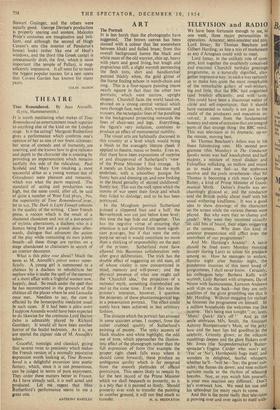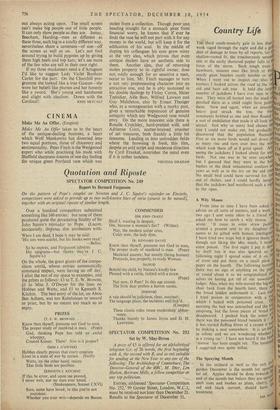TELEVISION and RADIO
We have been fortunate enough to see, in one week, three major personalities in operation. Amateur, semi-amateur and pro, Lord Ismay, Sir Thomas Beecham and Gilbert Harding; as fine a trio of musketeers as any d'Artagnan could wish to meet.
Lord Ismay, in the unlikely role of corn- pere, knit together the excellently conceived and executed Churchill birthday greetings programme, in a naturally dignified, alto- gether impressive way; in such a way certainly as to make him quite the most remarkable of the remarkable gallery of well-wishers, big and little, that the BBC had assembled (and briefed) efficiently, and with taste. This could have been a disastrous welter of cliche and self-importance; that it should have succeeded so totally is not just to the credit of the producers and executives in- volved; it stems from the fundamental honesty and sense of occasion that are integral parts of that strange thing: the BBC mind. This was television at its dramatic, up-to- the minute, moving best.
Sir Thomas Beecham's Athos was in his finest fulminating vein. His second pro- gramme (this , Monday) in The Conductor Speaks series was half knockabout and half majesty, a mixture of royal disdain and Falstaffian rollicking, so mellow and round as to make one feel—as the eyebrows revolve and the jowls reverberate—that Sir Thomas is becoming a rich man's George Robey, a kind of Prime Minister of Good-
musical Mirth. Delius's Irmelin was en- chantingly glanced at; and the conductor told the British public about itself with his usual withering kindliness. It was a good idea to show drawings of the characters on the screen while the various themes were played. But why were they so clumsy and crude? Why were they mounted casually on odd bits of board, their edges sniggering at the camera. Why does this kind of amateur presentation still afflict even the smoothest of our programmes?
And Mr. Harding's Ararhis? A salvo should be fired every Monday morning (except during Lent) to salute his presence among us. How he manages to endure, Sunday night after Sunday night, the ponderous inanities of this most loved of programmes, I shall never know. Certainly, his colleagues help: Barbara Kelly with warmth, Lady Barnett with crispness, David Nixon with facetiousness, Eamonn Andrews with slaps on the back—but they are only satellites of the giant grumbling sun that is Mr. Harding. Without mugging (or malice) he focusses the programme on himself. In a million households the welcomes rise like incense: 'He's being nice tonight '; or, later, 'Mum! Quick! He's off ! ' And as the smile embraces Mts. Smith, the Assistant Ashtray Stamperouter's Mate, or the jerky bow and the bent lips bid goodbye to the celebrity, Grimsby glows; as the volcanic rumblings deepen and the glare flickers over Mr. Jones (the Suspendermaker's Butter- spreader's Engine Carder who won't say 'Yes' or 'No), HartlepoOls hugs itself, and wonders in delighted, fearful whispers, whether he'll—?will he—?no; the growl sub- sides; the flames die down; and nine million curtains rustle to the rhythm of releasing breaths, Nor, as ygu watch him yourself, is your own reaction any different. Don't let's overwork him. We need his size and his splendour for many years to come. And this is the point really that television is proving over and over again to itself with- out always acting upon. The small screen can't make big people out of little people. It can only show people as they are. Ismay, Beecham, Harding—men as different as these three, each big in a totally different way, nevertheless share a sameness—of size—off the screen as well as on. Let's not fool around trying to build pygmies up by giving them high heels and top hats; let's see more of the few who are tall in their own right.
If my three musketeers need a d'Artagnan I'd like to suggest Lady Violet Bonham Carter for the part. On the Churchill pro- gramme she looked like a true Gascon—she wore her beliefs like plumes and her honesty like a sword. She's' young and handsome and alight with idealism. Down with the









































 Previous page
Previous page